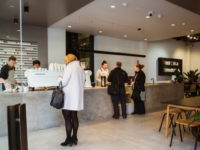
Aussie liquor company Edenvale Wine has come up with a new idea to create non-alcoholic wines that are suitable for pregnant mothers. It has non-alcoholic wines such as rosé, riesling and chardonnay which are sold at retail giants such as Coles, Woolworths, Dan Murphy’s and BWS.
The brand delivers “sophisticated non-intoxicating lifestyle beverage” to drink without the hangover. Inside FMCG interviewed Michael Bright, founder of Edenvale Wine.
“We initially partnered with the supermarkets, Coles and Woolworths, back in 2006. We were the only offering that met their production standards. Now, through their review processes, we are retained on our quality and the diversity of offering in the varietal tastes we offer consumers. We are seeing good growth and welcomed endorsement from the liquor channels, with Dan Murphy’s, the biggest national liquor retail group by sales, now carrying almost all of our range,” he said.
Inside FMCG: Why did you decide to go non-alcoholic for Edenvale Wine?
MB: We saw an opportunity for a premium, sophisticated, adult, lifestyle beverage that wasn’t intoxicating. A drink that wasn’t just a high sugar juice or soft drink – something with a more sophisticated flavour that could be savoured, accompany food or be enjoyed at any time. This type of beverage fits in with a more modern lifestyle, allowing for choice and can still be a part of any occasion.
Inside FMCG: Take us through the process of making Edenvale Wine.
MB: In summary, our wines are made the same way that regular wine is made. The normal varietal of wine is produced, and then we remove the alcohol. Sounds pretty simple but the process of removing the alcohol can be quite intricate.
The normal wine needs to be produced so we can hold on to all of the benefits of the fermentation process – higher levels of antioxidants than juice, the vinous flavour and all the digestive enzymes. This assures that consumers can still receive all of the benefits from wine without the consumption or impact of alcohol.
After the wine is produced in its normal form, we use the latest technology to remove the alcohol. This is done through the use of a spinning cone column that has been modified for our specific requirements. It’s a physical process with no chemicals added and this technology allows us to take out the alcohol at a relatively low temperature – a temperature similar to that of natural fermentation and therefore not compromising the integrity of each alcohol removed wine varietal.
Through the alcohol removal process, depending on the wine varietal, different additions are also made, for example, some varietals like chardonnay, shiraz and cabernet may receive some oak treatment. All of our wines receive a small amount of varietal juice concentrate that helps to add richness to the palate. We still adhere to all of the Australian wine standards throughout our wine making process to ensure a quality product and a real wine experience, a process that a lot of our overseas competitors choose not to follow.
Inside FMCG: How much does it cost to make this type of drink?
MB: The costs involved in making our range of non-alcoholic wine are the same as those involved in making normal wine. However, given there’s an extra process – the removal of the alcohol, which involves the use of some expensive equipment – it does cost us a little more. This cost is very much required to ensure that we are producing a quality product.
Inside FMCG: What do you think will be the wine trends for 2020?
MB: The global trends we are seeing suggest there is a significant change coming to the beverage category, and for wine in particular, offering greater diversity of choice for consumers. People are drinking less alcohol, or when they are drinking alcohol, they are drinking better and being more selective. To fit into their lifestyle, consumers will be demanding a greater range of alcohol levels on offer in their beverage of choice, so we can expect to see the further rise and growth in the “No-Low” alcohol space.
Inside FMCG: Any new products are you planning to release in the market?
MB: We are always looking to develop new and different varietals and see how they would work with our alcohol removal process. There are some products we have created in the past which we are excited to re-release to market with continual improvements that we have been making through our processing.
At the moment, these include a new pink moscato and a riesling, as some of our overseas markets have expressed interest in these. There are also a lot of exciting opportunities coming in regards to our “No-Low” alcohol products, so keep watching this space!







